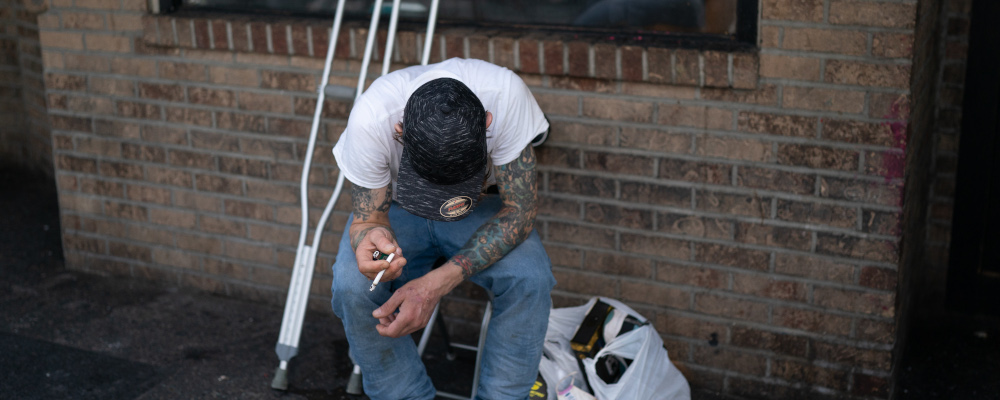There is a notion that Pierre Poilievre’s detox and rehab policy and the liberal “safe supply” approach to addiction are two sides of the same coin, both aiming to solve the same problem. However, this assumption is incorrect.
These policies stem from fundamentally different understandings of the problem and its solution, thus reflecting the stark differences between conservative and liberal philosophies. Put simply, they are not two different answers to the same question but rather two distinct answers to two separate questions.
At the heart of this ideological divide lies the question of whether one can commit a crime against oneself. The liberal perspective, focusing on empowering and encouraging individuals to make good choices, refrains from casting blame on past decisions that led to their current predicament. In this view, while selling drugs may be a crime, being addicted to them is not.
On the other hand, the conservative viewpoint takes a more paternalistic approach: an addict has made a series of poor decisions and must face the consequences. To a conservative, an addict has committed a crime against themselves.
To unpack this further, we must consider how conservatives and liberals perceive crime. In a broader sense, crime is not merely an act against an individual but against society, or as we conceptualize it in Canada, against the Crown. For example, our criminal cases are presented as R v [Accused], where R stands for Rex (King) or Regina (Queen), symbolizing the societal nature of crime.
Crime demands both discipline and punishment. Society demands satisfaction through the punishment of crimes, and those who emerge from punishment should be “corrected” and not re-offend. This is broadly agreed in our politics. Where the disagreement lies is in what sorts of crimes warrant more discipline and which require more punishment. The mandatory treatment approach conservatives propose is a paternalistic solution fitting neatly into this framework. For example, a conservative, when prompted to imagine a drug addict harassing someone on the street or the subway, may feel disgusted rather than sympathetic to that addict. A conservative may see them as a person who should be disciplined into seeking treatment and becoming a productive member of society rather than coaxed, incentivized, or have their “relative harm” reduced.
This fundamental difference in how we view societal problems is evident in the current debate over drug policy. It’s also a question that divides the Right, with small-c conservatives affirming and right liberals (and libertarians) denying that committing a crime against oneself is possible.
The non-aggression principle (NAP), the cornerstone of the conception of liberal (and libertarian) morality, attempts to answer this question. Very generally, it can be considered as follows: no aggression against an individual, their property, or contracts is permitted without that individual’s consent. This principle does not contemplate any instances where an individual can harm oneself because if one were to harm oneself, one consents to do so. A more traditional conservative would criticize this idea because it operates on the assumption that all humans are always rational actors, which is patently untrue.
A thorny issue for right liberals arises when considering entirely fictional child pornography, like drawings or AI-generated photos. The libertarian argument of “no harm, no foul” is a difficult position to defend, particularly because such material elicits a powerful disgust response. Beyond any grand ideas of morality, we collectively oppose even artificially generated child pornography because it is disgusting. While often overlooked, this emotion plays a significant role in our moral calculus.
Disgust, powerful and visceral, is both a smoke alarm and a nuisance. While it should not be the sole guiding force of our morality—in fact, one should absolutely consider the fact that disgust is often tied to dehumanization, and dehumanization leads to human catastrophe—it does warrant the understanding that many of our moral judgements are strongly tied to disgust. This leads us to question whether our societal response to imperfect human behaviour should be. The conservative conception of morality stated ecumenically as possible would suggest that it is possible to commit a crime against one’s soul, and a crime against one’s soul may sometimes warrant state intervention to discipline and punish that individual for weakening the overall moral fibre of society.
Everyone agrees that parents may prevent children from eating candy for breakfast every day, even though this is a perfectly permissible (albeit certainly not one that is recommended) choice for an adult. The question of what “harms” parents are allowed or not allowed to prevent for their children is complex, and liberal arguments often break down when applied to non-adults.I do not claim to offer any bright line rule here, but we know of several examples of such debates: should a parent be notified if a child expresses to a teacher that they have body dysphoria? Is there a meaningful difference between that and children who display signs of depression or suicidal ideation? What about an eating disorder (a type of body dysphoria) versus gender dysphoria? The usual response is that these are heavily context-dependent, which makes writing legal rules for a diverse society extremely challenging.
Similarly, addicts, who can often be seen as dependents due to their inability to make rational decisions about their addiction, pose a significant policy challenge. The question of when intervention is necessary is not easily answered by the NAP alone, suggesting the need for a more paternalistic approach. The very fact that drug addicts continue to exist despite a safe supply is evidence enough for a conservative to question the effectiveness of a purely incentive-based approach. Similarly, the persistent existence of violent criminals even after posting bail is a testament to the limitations of the liberal approach.

In this context, the stance of Poilievre becomes especially relevant. The more fundamental disagreement underpinning his policy is whether quality of life is considered in these decisions. Are all lives equally worthwhile? Should they all be protected equally? With finite resources, how do we decide how they get allocated? On its face, the argument is that pouring money into a safe supply seems especially unwise when we lack options for treatment and recovery.
This dichotomy between conservatives and liberals can be understood better if one realizes they are not even speaking the same language. The conservative is focused on the specific, where the existence of crime is itself repugnant and warrants a stricter approach. In contrast, the liberal is focused on the general, where more gentle nudging and incentives will eventually produce their ideal society.
Conservatives hold the more intuitive position that our emotions are the primary driver of our morality. However, they often fail to articulate this in a language that could counter a general principle such as the NAP. Conservatives need to remember that moral judgments are not merely subjective expressions of feelings but reflect objective claims about what is good for humans in relation to their social roles and traditions.
In this sense, there is rationality in our emotions. They are not simply expressions of hooray or boo but rather reflect what conservatives hold to be objective truths. Accordingly, there is a rational basis for their morality that goes beyond the limitations of the NAP: conservatives oppose consuming illicit drugs, the consumption of AI-generated child pornography, and eating candy for breakfast because these actions do not contribute to a fulfilling life.
The respective perceptions of crime, punishment, discipline, and harm of each side underpin their approach to policy-making around crime. It’s crucial to understand these differences, as they define the very problems our society is perceived to be facing. Furthermore, the role of emotions, often under-discussed, must be given due consideration in shaping our moral and political discourse. Without a thorough understanding of one’s opponent’s worldview, our political discourse, and ultimately our democracy, risks further deterioration.
By acknowledging the rationality in our emotions and the limitations of a purely incentive-based approach, we can foster a more nuanced understanding of these complex societal issues. The conservative and liberal approaches to drug policy are not simply two sides of the same coin—they are distinct philosophical perspectives that shape our understanding of crime, punishment, and societal well-being.
Recommended for You

The Supreme Court slaps down Trump’s tariffs—but Canada isn’t in the clear yet: The Weekly Wrap

‘They will walk all over us’: Former security analyst on how Canada is leaving itself open to more Chinese interference

‘Huge implications’: The Roundtable on the U.S. Supreme Court’s bombshell tariff ruling against Trump

After snubbing Don Cherry for over 40 years, the Order of Canada should drop politics and appoint him




